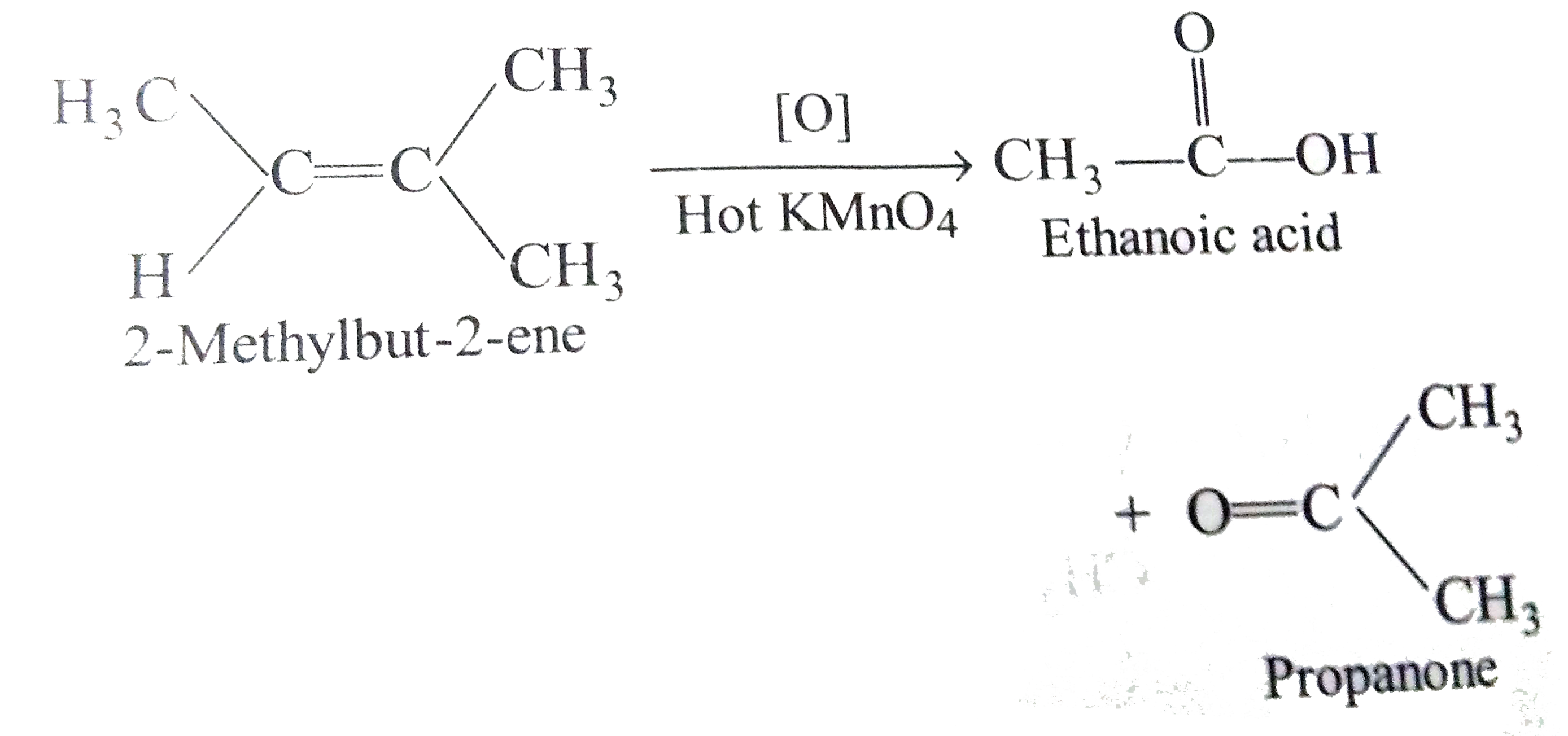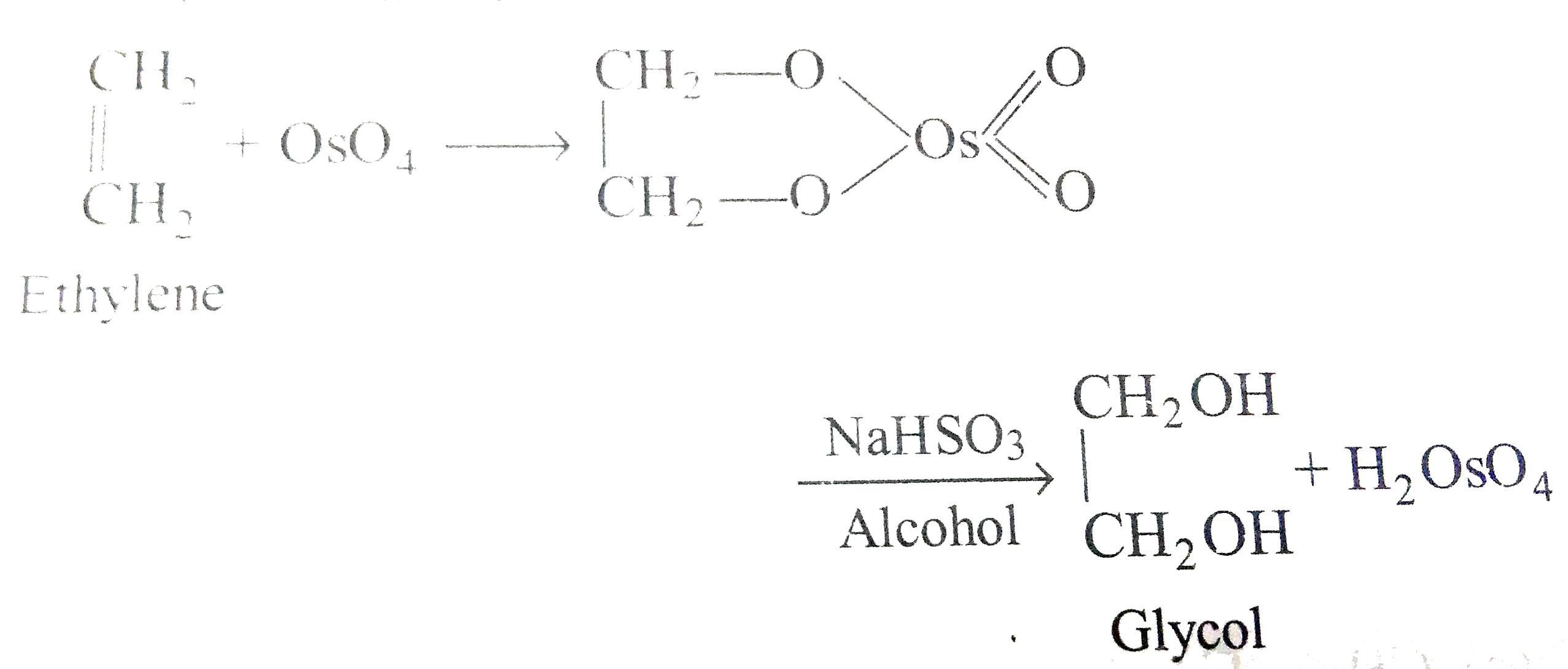Xylenes on oxidation with acidic KMnO4 gives
Terphthalic acid
Phthalic acid
Isophthalic acid
All of these
The correct Answer is:D
To solve the question regarding the oxidation of xylenes with acidic KMnO₄, we will follow these steps:
Step 1: Identify the Structure of Xylenes
Xylenes are dimethyl-substituted benzenes, and there are three isomers:
- Ortho-xylene: Two methyl groups on adjacent carbon atoms (1,2-dimethylbenzene).
- Meta-xylene: Methyl groups on carbon atoms separated by one carbon atom (1,3-dimethylbenzene).
- Para-xylene: Methyl groups on opposite carbon atoms (1,4-dimethylbenzene).
Step 2: Understand the Oxidation Reaction
When xylenes are oxidized, particularly with a strong oxidizing agent like acidic KMnO₄, the methyl groups (-CH₃) are oxidized to carboxylic acid groups (-COOH).
Step 3: Determine the Products of Oxidation
- Ortho-xylene: Upon oxidation, it forms isophthalic acid (1,3-benzenedicarboxylic acid) where the carboxylic acid groups are at the 1 and 3 positions.
- Meta-xylene: Oxidation leads to the formation of isothalic acid (1,2-benzenedicarboxylic acid) where the carboxylic acid groups are at the 1 and 2 positions.
- Para-xylene: This will yield phthalic acid (1,4-benzenedicarboxylic acid) where the carboxylic acid groups are at the 1 and 4 positions.
Step 4: Summarize the Products
Thus, the oxidation of xylenes with acidic KMnO₄ gives:
- Ortho-xylene → Isophthalic acid
- Meta-xylene → Isothalic acid
- Para-xylene → Phthalic acid
Final Answer
Xylenes on oxidation with acidic KMnO₄ yield phthalic acid and isothalic acid.
---
Xylenes are dimethyl-substituted benzenes, and there are three isomers:
- Ortho-xylene: Two methyl groups on adjacent carbon atoms (1,2-dimethylbenzene).
- Meta-xylene: Methyl groups on carbon atoms separated by one carbon atom (1,3-dimethylbenzene).
- Para-xylene: Methyl groups on opposite carbon atoms (1,4-dimethylbenzene).
When xylenes are oxidized, particularly with a strong oxidizing agent like acidic KMnO₄, the methyl groups (-CH₃) are oxidized to carboxylic acid groups (-COOH).
- Ortho-xylene: Upon oxidation, it forms isophthalic acid (1,3-benzenedicarboxylic acid) where the carboxylic acid groups are at the 1 and 3 positions.
- Meta-xylene: Oxidation leads to the formation of isothalic acid (1,2-benzenedicarboxylic acid) where the carboxylic acid groups are at the 1 and 2 positions.
- Para-xylene: This will yield phthalic acid (1,4-benzenedicarboxylic acid) where the carboxylic acid groups are at the 1 and 4 positions.
Thus, the oxidation of xylenes with acidic KMnO₄ gives:
- Ortho-xylene → Isophthalic acid
- Meta-xylene → Isothalic acid
- Para-xylene → Phthalic acid
Xylenes on oxidation with acidic KMnO₄ yield phthalic acid and isothalic acid.
Topper's Solved these Questions
- HYDROCARBONBOOK - ERRORLESS CHAPTER - HYDROCARBONEXERCISE - CRITICAL THINKING (Objective questions)
24 Videos
- HYDROCARBONBOOK - ERRORLESS CHAPTER - HYDROCARBONEXERCISE - JEE SECTION (Only one choice correct answer)
93 Videos
- HYDROCARBONBOOK - ERRORLESS CHAPTER - HYDROCARBONEXERCISE - ORDINARY THINKING (Objective question) (ALKYNE)
120 Videos
- HALOGEN CONTAINING COMPOUNDBOOK - ERRORLESS CHAPTER - HALOGEN CONTAINING COMPOUNDEXERCISE - Critical Thinking (Jee (Advanced) 2018)
1 Videos
- IONIC EQUILIBRIUMBOOK - ERRORLESS CHAPTER - IONIC EQUILIBRIUMEXERCISE - JS Jee Section (JEE Advanced (Numeric answer type question))
1 Videos
Similar Questions
Knowledge Check
Which alkene on oxidation with acidic KMnO4 gives only acetic acid?
ACH3=CH−CH3BCH3−CH=CH−CH3CEthyuleneDPentene-2An aromatic compound (A),C8H10, on oxidation with acidic KMnO4 gives dibasic acid. The compound (A) on nitration gives three isomeric nitro derivatives. The compound (A) is:
Aa.o-XyleneBb.m-XyleneCc.p-XyleneDd.Ethyl benzeneBut-1-yne on reaction with hot acidic KMnO4 gives
ACH3CH2CH2COOHBCH3CH2COOHCCH3CH2COOH+CO2DCH3CH2COOH+HCOOH
The compound Me3C−NH2 on oxidation with acidic KMnO4 gives:
View SolutionOxidation of alkenes by cleavage with the acidic or alkaline KmNO4 of acidic K2Cr2O7 at higher temperature yields products depending upon the nature of alkene. A hot solultion of KMnO4 is a strong oxidising agent which gives only ketones and carboxylic acids and not aldehydes (as they cannot be isolated).

Oxidation of alkenes with OsO4 followed by alcoholic NaHSO3 or Na2SO3 yeilds glycols.

Answer the following questions:
Which of the following alkenes on oxidation with hot KMnO4 gives cyclopentanone?
View SolutionSecondary amines on oxidation with KMnO4 gives:
View SolutionToluene, on oxidation with KMnO4 gives
View Solution2-methyl propane on oxidation with KMnO4 gives
View Solution
